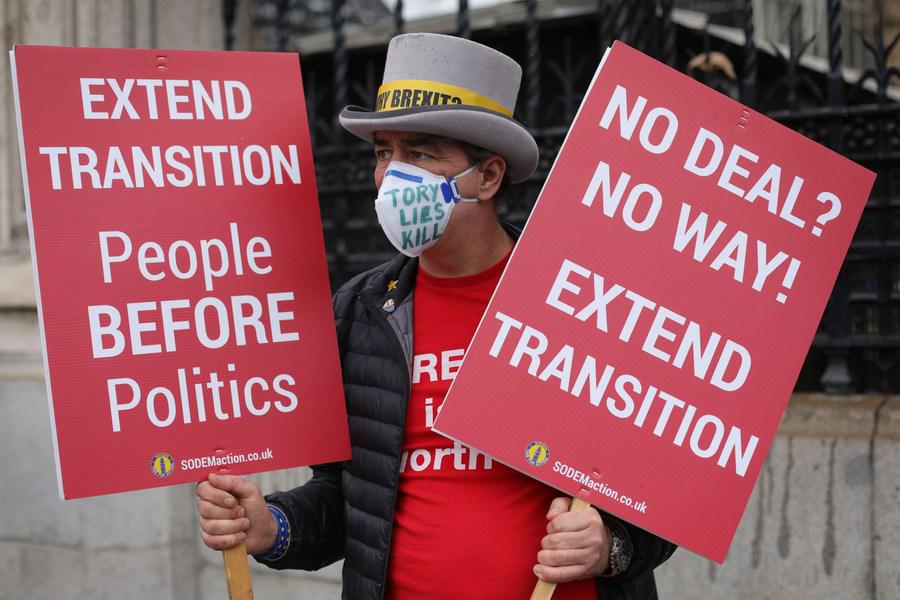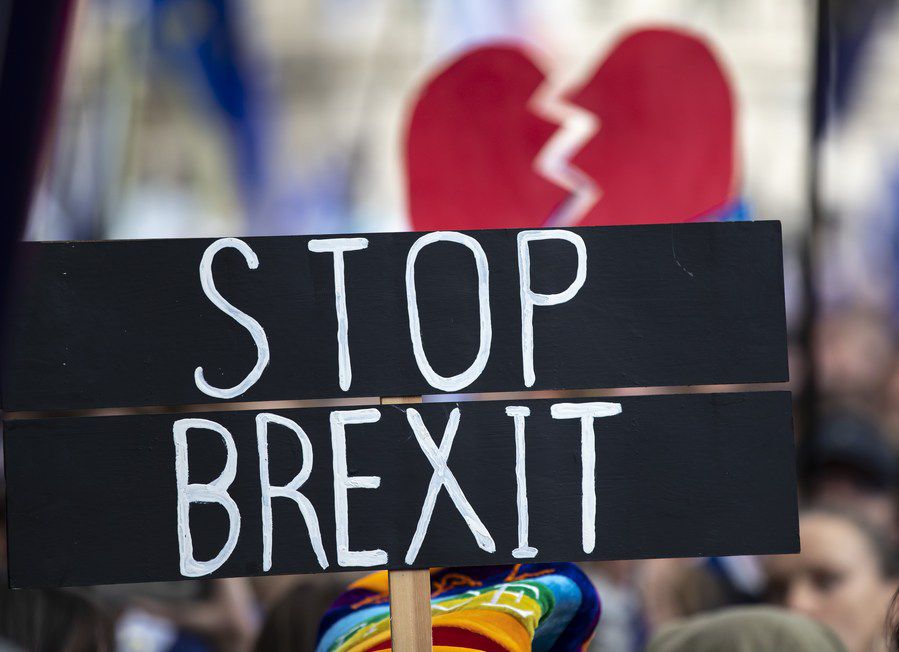Deadlocked UK-EU post-Brexit trade talks disturbing, says UK

A demonstrator holds placards demanding extension of Brexit transition period outside the Houses of Parliament in London, Britain, on June 10, 2020. (Photo by Tim Ireland/Xinhua)
As Boris Johnson travels to Brussels with a deal hanging in the balance dangerously close to the deadline, both sides are still hoping for a breakthrough.
Despite both Johnson and Von der Leyen holding private virtual conversations, no progress has been made on their part. So Johnson's trip to Brussels is seen as a last-ditch effort to salvage a deal.
LONDON, Dec. 9 (Xinhua) -- With only three weeks left before the Brexit transition period ends on Dec. 31 this year, a British political expert has described the fact that there has been little progress between the two sides as "disturbing".
As British Prime Minister Boris Johnson heads to Brussels for a crunch meeting later Wednesday with European Commission President Ursula von der Leyen to seek a breakthrough in the lengthy post-Brexit trade talks, Rajneesh Narula, the John H. Dunning Chair of International Business Regulation at the Henley Business School, University of Reading, warned that both sides need to make practical compromises soon to avoid a damaging no deal Brexit.

People walk past the Houses of Parliament in London, Britain, Dec. 5, 2020. (Photo by Ray Tang/Xinhua)
STICKING POINTS
In a joint statement on Monday, Johnson and Von der Leyen said that the conditions for finalizing a trade agreement "are not there due to the remaining significant differences on three critical issues: level playing field, governance and fisheries" between the two sides.
According to Narula, the reason these issues are yet to be resolved is because "nobody wants to be the first to blink."
"Everybody knows that the costs are high on both sides, it's not just the United Kingdom that will lose out. It will also be a few percent of the Dutch economy that will take a hit, the French economy will take a hit. Everybody knows that, everybody would rather not take a hit at this stage," Narula said.
"Everybody wants a deal, but nobody wants to look like they stepped, that they lost face," Narula said, adding that both sides have to appeal to their own domestic wants and needs and that is why negotiations are where they are.
Significant differences still exist between London and Brussels on the sticking points after lengthy negotiations on the post-Brexit trade relations.
One of the significant issues is the "level playing field", referring to a set of shared rules and standards to ensure businesses in one country do not have an unfair advantage over their competitors in others.
The European Union (EU) wants Britain to follow the rules of the regional bloc closely in areas such as workers' rights and environmental regulations, but Britain says the goal of Brexit is to break free from following common rules and reassert national sovereignty.
On the so-called "governance", the two sides disagree on how any deal would be enforced and how any future trading disputes should be resolved.
On fishing, the EU is warning that without ongoing access to the British waters for its fleets, the British fishermen will no longer have special access to the EU markets to sell their goods. But Britain argues that what goes on in its own waters should be under its control as a sovereign country.
Narula warned that both sides need to make practical compromises on these issues to avoid a damaging no-deal Brexit.
"You're staring down something that's going to cost a lot of money, it will be in the billions. But what is your pride worth? That's a really kind of philosophical question," Narula said.

File photo taken on Oct. 19, 2019 shows people taking part in "Together for the Final Say" event at the Parliament Square in London, Britain. (Xinhua/Han Yan)
JOHNSON'S CRUCIAL TRIP TO BRUSSELS
Despite both Johnson and Von der Leyen holding private virtual conversations, no progress has been made on their part. So Johnson's trip to Brussels is seen as a last-ditch effort to salvage a deal.
The two leaders have had phone conversations several times instead of face-to-face discussions due to the COVID-19 pandemic. To bring life back to normal, countries including Britain, China, Germany, Russia, and the United States are racing against time to find a vaccine.
For Narula, Johnson's trip is to enhance trust between the two sides so that talks can continue in the coming days.
If an agreement is not reached and ratified by Dec. 31, Britain and the EU could follow World Trade Organization rules and introduce import charges on each other's goods.

